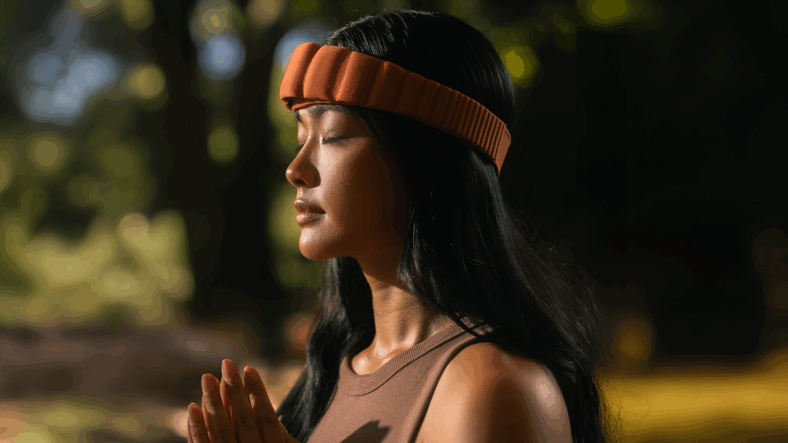
NBA teams spend close to half the season bouncing between time zones and charter flights. A good night’s sleep becomes about as scarce as sinking a full-court shot. Studies show direct links between poor sleep and impaired reaction time, shooting accuracy, decision-making, and other critical metrics like rebounds and turnovers. An NBA executive recently described sleep deprivation among players as “the dirty little secret that everybody knows about.”
A company called Somnee believes their device can be a game changer not just for traveling teams but for the rest of the exhausted population. They gave the NBA and WNBA a batch of their smart sleep headbands as part of a six-week pilot program called 2025 NBA Launchpad. The results were the opposite of a wake-up call. Those who wore the headband slept 37 minutes longer on average with 20 percent more REM sleep and 15 percent fewer sleep interruptions.
What’s the secret? Somnee’s second-generation smart sleep headband uses gentle neurostimulation to guide your brain into a deeper sleep. The fabric sits across your forehead like a soft visor or one of those 1970s headbands Dr. J used to wear. The app controls the sessions. You can set it for a full nigh, a nap, or a middle-of-the-night drift back if you wake up at 3 a.m.
In a sleep-deprived world where every extra minute of shuteye matters, this counts as a slam dunk. “We took everything we learned—from our passionate Gen 1 community and research pilot with the NBA—and poured it into creating the most advanced, AI-powered sleep wearable on the market,” said Somnee CEO, Tim Rosa.
The company did not land on this technology right away. Over the course of seven years, Somnee’s science team, led by sleep expert Dr. Matt Walker, PhD, and a group of scientists from the University of California, Berkeley, tested auditory signals, vibrations, and experimented with light. The breakthrough came when they started using gentle electrical pulses that were timed to a person’s own brain signals during sleep. Their research showed it did not just help people fall asleep faster. It strengthened deep-sleep brainwaves. It cut wake-ups by about a third and added close to 30 minutes of total sleep time on average.
Here is what the new, second-generation device offers:
- Lab-grade EEG sensors that monitor your brain activity in real time
- Personalized neurostimulation that helps the brain transition into deeper sleep states
- Bone conduction speakers for audio without earbuds
- A redesigned fit that supports both back and side sleepers
- App-based modes for nighttime sleep, naps, and “drift back” sessions after wake-ups
Like many NBA players, most Americans walk around in a fog. Only about 15 percent of people report getting the recommended 7 to 9 hours of sleep at least five nights per week. This is not healthy, according to experts. “Decades of research have shown that sleep is the foundation of brain function, emotional stability, immune health, and longevity,” said Dr. Walker.
Here’s hoping regular people get the same sleep boost as the seven footers.